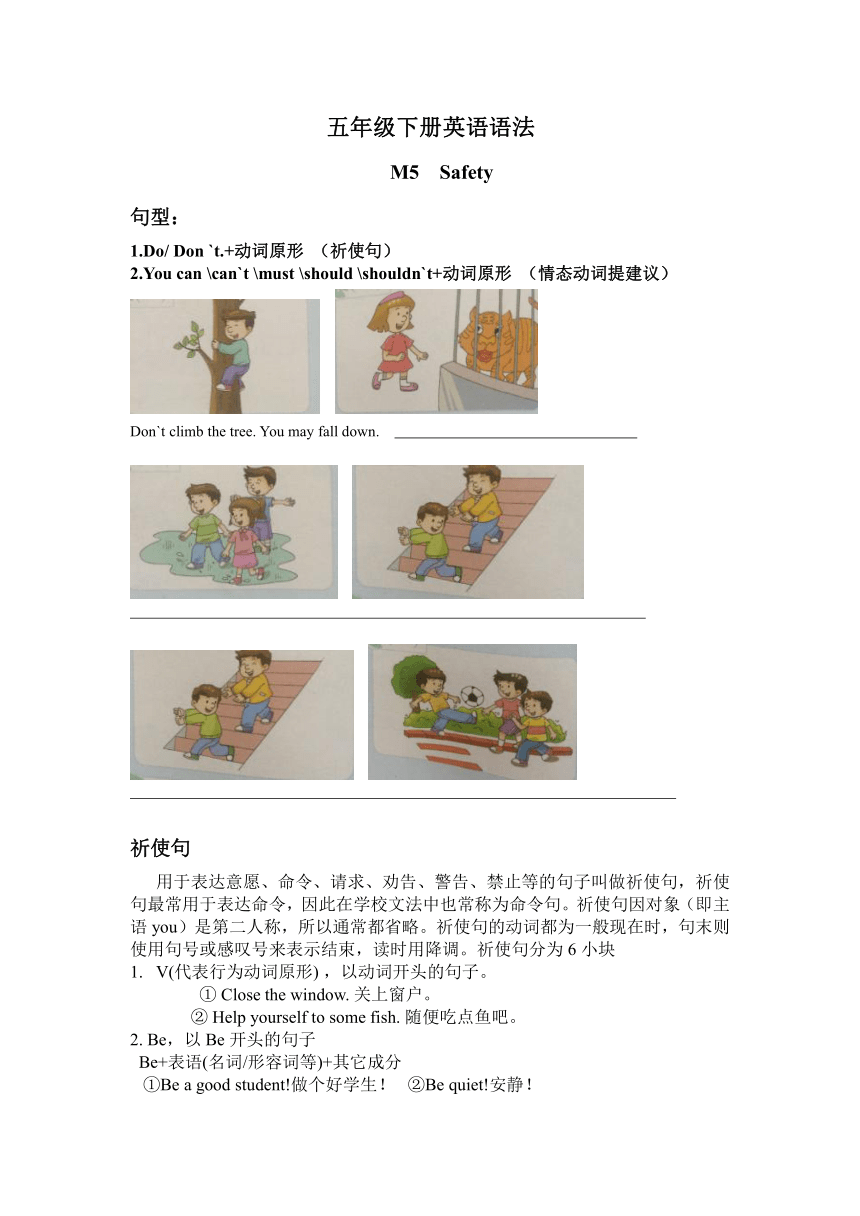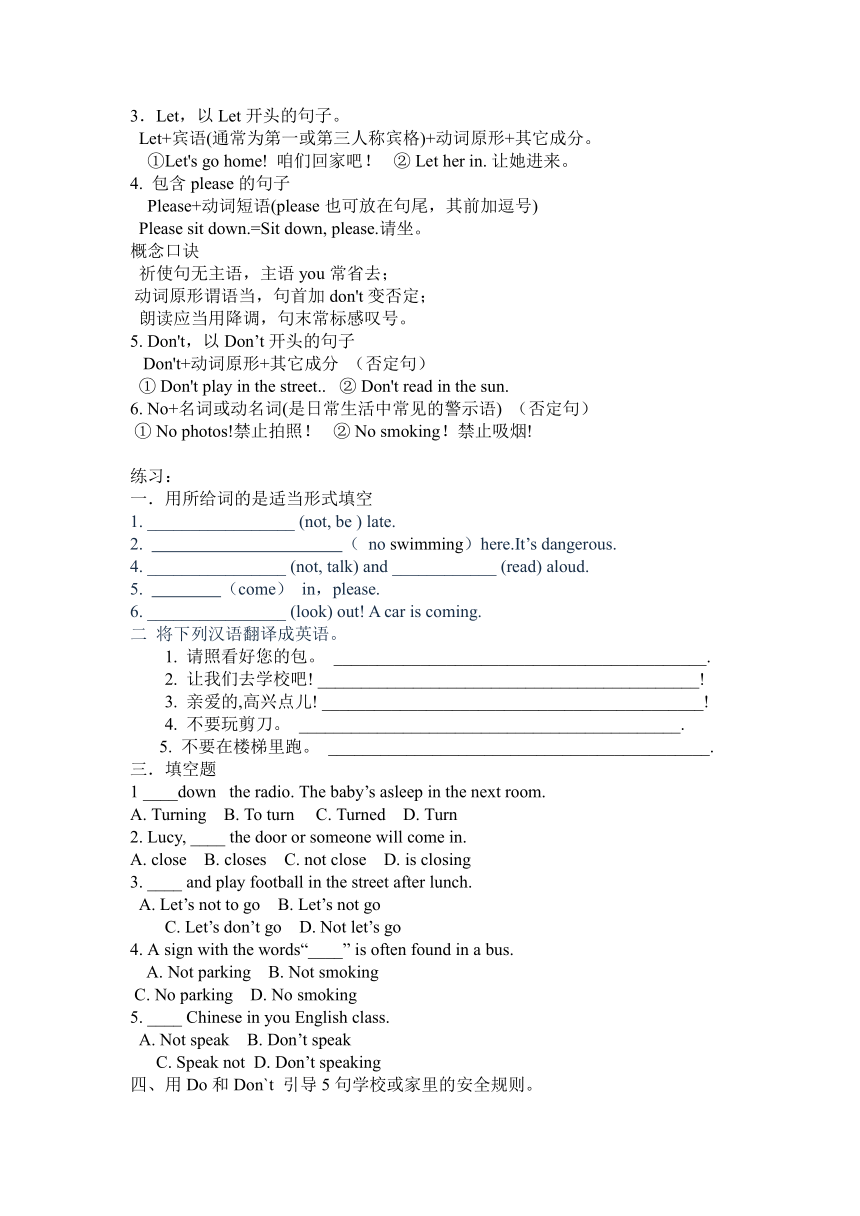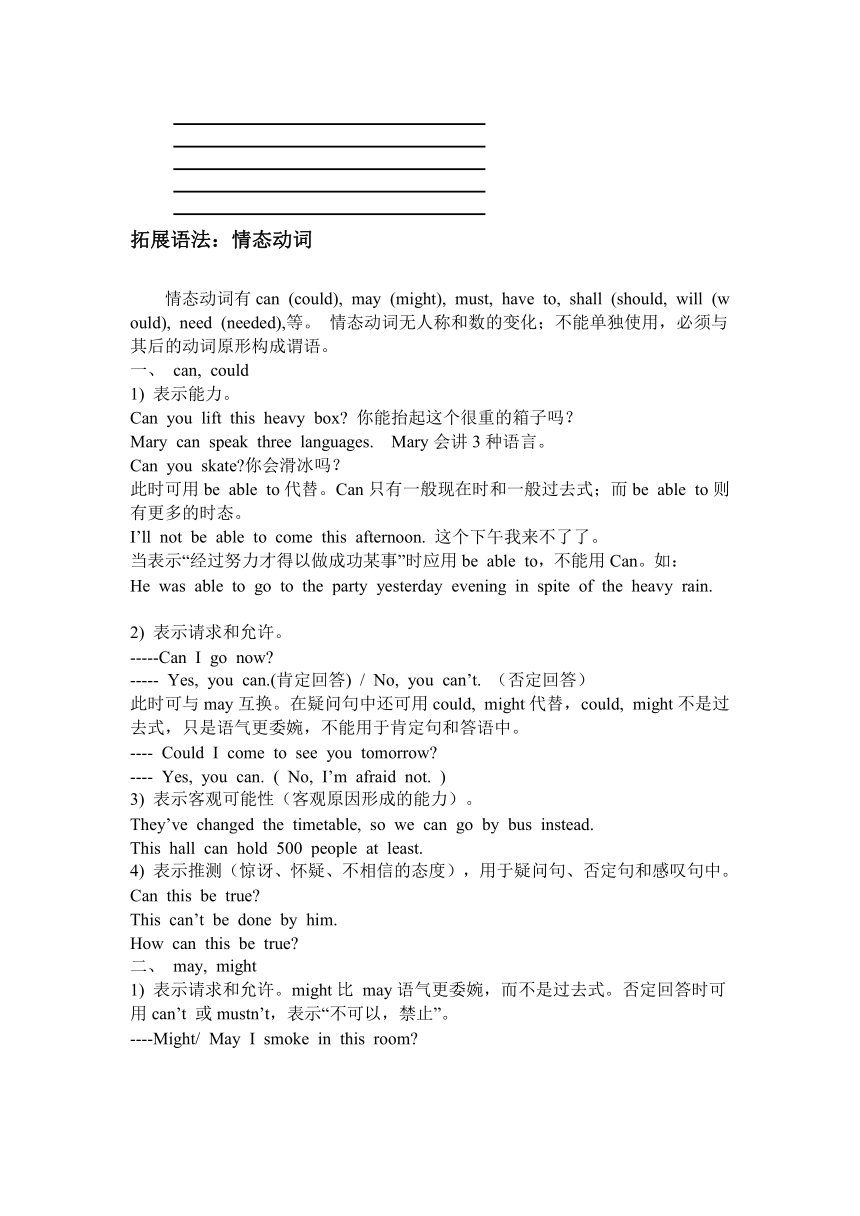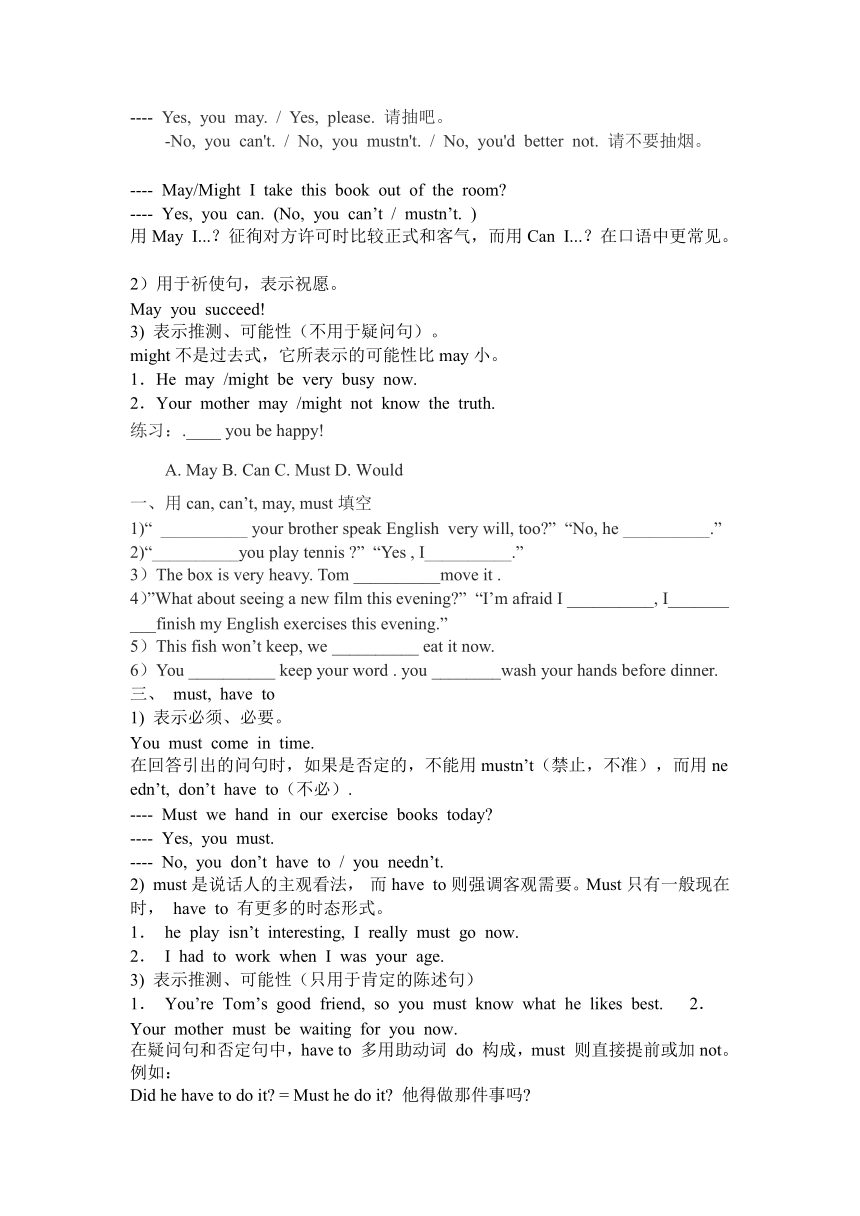教科版(广州) 五年级下册 Module5-6句型语法讲义+练习(无答案)
文档属性
| 名称 | 教科版(广州) 五年级下册 Module5-6句型语法讲义+练习(无答案) |

|
|
| 格式 | docx | ||
| 文件大小 | 278.8KB | ||
| 资源类型 | 教案 | ||
| 版本资源 | 教科版(广州) | ||
| 科目 | 英语 | ||
| 更新时间 | 2024-09-27 22:33:12 | ||
图片预览




文档简介
五年级下册英语语法
M5 Safety
句型:
Do/ Don `t.+动词原形 (祈使句)
You can \can`t \must \should \shouldn`t+动词原形 (情态动词提建议)
Don`t climb the tree. You may fall down.
祈使句
用于表达意愿、命令、请求、劝告、警告、禁止等的句子叫做祈使句,祈使句最常用于表达命令,因此在学校文法中也常称为命令句。祈使句因对象(即主语you)是第二人称,所以通常都省略。祈使句的动词都为一般现在时,句末则使用句号或感叹号来表示结束,读时用降调。祈使句分为6小块
V(代表行为动词原形) ,以动词开头的句子。
① Close the window. 关上窗户。
② Help yourself to some fish. 随便吃点鱼吧。
2. Be,以Be开头的句子
Be+表语(名词/形容词等)+其它成分
①Be a good student!做个好学生! ②Be quiet!安静!
3.Let,以Let开头的句子。
Let+宾语(通常为第一或第三人称宾格)+动词原形+其它成分。
①Let's go home! 咱们回家吧! ② Let her in. 让她进来。
4. 包含please的句子
Please+动词短语(please也可放在句尾,其前加逗号)
Please sit down.=Sit down, please.请坐。
概念口诀
祈使句无主语,主语you常省去;
动词原形谓语当,句首加don't变否定;
朗读应当用降调,句末常标感叹号。
5. Don't,以Don’t开头的句子
Don't+动词原形+其它成分 (否定句)
① Don't play in the street.. ② Don't read in the sun.
6. No+名词或动名词(是日常生活中常见的警示语) (否定句)
① No photos!禁止拍照! ② No smoking!禁止吸烟!
练习:
一.用所给词的是适当形式填空
1. _________________ (not, be ) late.
2. ( no swimming)here.It’s dangerous.
4. ________________ (not, talk) and ____________ (read) aloud.
5. (come) in,please.
6. ________________ (look) out! A car is coming.
二 将下列汉语翻译成英语。
1. 请照看好您的包。 ___________________________________________.
2. 让我们去学校吧! ____________________________________________!
3. 亲爱的,高兴点儿! ____________________________________________!
4. 不要玩剪刀。 ____________________________________________.
5. 不要在楼梯里跑。 ____________________________________________.
三.填空题
1 ____down the radio. The baby’s asleep in the next room.
A. Turning B. To turn C. Turned D. Turn
2. Lucy, ____ the door or someone will come in.
A. close B. closes C. not close D. is closing
3. ____ and play football in the street after lunch.
A. Let’s not to go B. Let’s not go
C. Let’s don’t go D. Not let’s go
4. A sign with the words“____” is often found in a bus.
A. Not parking B. Not smoking
C. No parking D. No smoking
5. ____ Chinese in you English class.
A. Not speak B. Don’t speak
C. Speak not D. Don’t speaking
用Do和Don`t 引导5句学校或家里的安全规则。
拓展语法:情态动词
情态动词有can (could), may (might), must, have to, shall (should, will (would), need (needed),等。 情态动词无人称和数的变化;不能单独使用,必须与其后的动词原形构成谓语。
一、 can, could
1) 表示能力。
Can you lift this heavy box 你能抬起这个很重的箱子吗?
Mary can speak three languages. Mary会讲3种语言。
Can you skate 你会滑冰吗?
此时可用be able to代替。Can只有一般现在时和一般过去式;而be able to则有更多的时态。
I’ll not be able to come this afternoon. 这个下午我来不了了。
当表示“经过努力才得以做成功某事”时应用be able to,不能用Can。如:
He was able to go to the party yesterday evening in spite of the heavy rain.
2) 表示请求和允许。
-----Can I go now
----- Yes, you can.(肯定回答) / No, you can’t. (否定回答)
此时可与may互换。在疑问句中还可用could, might代替,could, might不是过去式,只是语气更委婉,不能用于肯定句和答语中。
---- Could I come to see you tomorrow
---- Yes, you can. ( No, I’m afraid not. )
3) 表示客观可能性(客观原因形成的能力)。
They’ve changed the timetable, so we can go by bus instead.
This hall can hold 500 people at least.
4) 表示推测(惊讶、怀疑、不相信的态度),用于疑问句、否定句和感叹句中。Can this be true
This can’t be done by him.
How can this be true
二、 may, might
1) 表示请求和允许。might比 may语气更委婉,而不是过去式。否定回答时可用can’t 或mustn’t,表示“不可以,禁止”。
----Might/ May I smoke in this room
---- Yes, you may. / Yes, please. 请抽吧。
-No, you can't. / No, you mustn't. / No, you'd better not. 请不要抽烟。
---- May/Might I take this book out of the room
---- Yes, you can. (No, you can’t / mustn’t. )
用May I...?征徇对方许可时比较正式和客气,而用Can I...?在口语中更常见。
2)用于祈使句,表示祝愿。
May you succeed!
3) 表示推测、可能性(不用于疑问句)。
might不是过去式,它所表示的可能性比may小。
1.He may /might be very busy now.
2.Your mother may /might not know the truth.
练习:.____ you be happy!
A. May B. Can C. Must D. Would
一、用can, can’t, may, must填空
1)“ __________ your brother speak English very will, too ” “No, he __________.”
2)“__________you play tennis ” “Yes , I__________.”
3)The box is very heavy. Tom __________move it .
4)”What about seeing a new film this evening ” “I’m afraid I __________, I__________finish my English exercises this evening.”
5)This fish won’t keep, we __________ eat it now.
6)You __________ keep your word . you ________wash your hands before dinner.
三、 must, have to
1) 表示必须、必要。
You must come in time.
在回答引出的问句时,如果是否定的,不能用mustn’t(禁止,不准),而用needn’t, don’t have to(不必).
---- Must we hand in our exercise books today
---- Yes, you must.
---- No, you don’t have to / you needn’t.
2) must是说话人的主观看法, 而have to则强调客观需要。Must只有一般现在时, have to 有更多的时态形式。
1. he play isn’t interesting, I really must go now.
2. I had to work when I was your age.
3) 表示推测、可能性(只用于肯定的陈述句)
1. You’re Tom’s good friend, so you must know what he likes best. 2. Your mother must be waiting for you now.
在疑问句和否定句中,have to 多用助动词 do 构成,must 则直接提前或加not。例如:
Did he have to do it = Must he do it 他得做那件事吗
而且在否定句中,have to 表不需要,must 表不允许:
You don't have to go there. 你不需要去那儿。
You mustn't go there 你不可去那儿。
练习:Must we come tomorrow ---
A. No, you can't B. No, you needn't
C. No, you mustn't D. No, you may not
练习: You ___miss the lesson, though we___ have it on Thursday.
A. mustn't...needn't B. needn't....mustn't
C. mustn't...mustn't D. needn't...needn't
用mustn’t, needn’t 填空
1)Time is flying. We __________ waste our time.
2)You __________ be afraid of the difficulty. We’ll give you a helping hand.
3)”Must I hand in the maths exercises tomorrow ” “No , you __________ . You may hand it in the day after tomorrow.”
4)Tom , you __________ read in the moon light. It’s no good for your eyes.
5)You __________ worry so much. I’m sure he’ll be well soon.
五、 shall, should
1) shall 用于第一人称,征求对方的意见。
What shall we do this evening
2) should, 表示义务或责任,
I should help her because she is in trouble.
3) 表示劝告、建议和命令,在疑问句中常用should。
1. You should go to class right away.
2. Should I open the window
六、 will, would
1) 表示请求、建议等,would更委婉。
Will / Would you pass me the ball, please
2) 表示意志、愿望和决心。
1. I will never do that again.
2. They asked him if he would go abroad.
3) 表示估计和猜想。
It would be about ten o’clock when she left home.
练习:"When _____ he leave the hospital " I asked the doctor.
A. will B. shall C. can D. may
练习
用should 或shouldn`t 填空。
We cross the road when the light is red.
We watch TV too much.
We tell your parents if your brother,sister,or your cousin is in trouble.
You eat lots of food at one time.
You leave home if you don`t tell your parents.
We help each other.
We play with knives.
2. ______I go back before lunch
-----No, I don't think you________.
A. Need...must B. Do...need to C. Must...have to D. May .... ought to
3. The teacher do all the exercises, but a pupil_______.
A. needn't....must B. may not...must
C. needn't....needn't D. can't....must
4. Would you open the window please
Yes, I______.
A. will B. would C. do D. can
5. A lion only attacks a human being when it is hungry.
A. should B. can C. will D. shall
6. ____Must I finish this novel this morning
____No, you_____.
A. mustn't B. might not C. don't have to D. can't
7. The taxi ____ only hold six passengers. It is full. You take the next one.
A. may...may B. can...may C. may...can D. must...can
M6 Directions
表示问路的常用语以及它们的应答:
问路的三种常见问法:
Excuse me, I’m lost. Could you please tell me the way to the nearest subway station
Excuse me, lady. Do you know how to get to the railway station, please How can I get to the railway station/there, please
Excuse me, sir. Is there a bank near here
I am looking for a bank. Could you please tell me where it is
位置的表达:
There is one on the corner of this street and Zhongshang Silu.
It’s on Maple Street. It’s across from a park.
It’s opposite to a park . In front of / behind / (it’s right behind you)
Beside/ next to/ near On the left, on the right
A: Is it far from here
B: It’s very close, only 5 minutes’ walk.
A: How can I get there, please
直走的几种表达
Walk /go straight ahead/ walk ahead, walk straight to, walk along this street to , go up this street to , go down the First Avenue to the first crossing/ traffic lights, block/ … street, walk straight for 10 minutes ,’
转弯的几种表达:
Turn left/right on the second corner, at the second traffic lights, at the second crossing,at the end of the road Take the left/right/, take the first right/second left
Turn left out of the hotel, turn right into the park
Walk into, walk out of , walk along walk across walk through
练习:
用适当的单词填空,使对话成立
A:___________ me.________ you tell me the _______ to the No.1 Middle School, please
B: Yes. But it's quite far away _______ here. Go straight ahead._____ the fourth left. ______take _______second right. The school is your left.
A: Can I _____ a No.34 bus to get there
B: No.But you can ______ a No.6 bus. There ______a bus stop(车站)______ there.
A: Thank you very _________.
B: You're _________.
A: Can you tell me ________ to get to the Shanghai Restaurant, Please
B: Yes._______ left out of the hotel. Go straight ahead. ______the first left. The restaurant is on your right.
选择适合的词组或句子填进对话中。
A:_________, could you tell me the way to Guangzhou library
(
Go straight ahead.
Thank you
Excuse me.
You
’
re welcome.
It
’
s on the right.
)B:Yes, _________, take the second left.
A:Is the library on the right or on the left
B:_________.
A:_________ so much.
B:_________.
M5 Safety
句型:
Do/ Don `t.+动词原形 (祈使句)
You can \can`t \must \should \shouldn`t+动词原形 (情态动词提建议)
Don`t climb the tree. You may fall down.
祈使句
用于表达意愿、命令、请求、劝告、警告、禁止等的句子叫做祈使句,祈使句最常用于表达命令,因此在学校文法中也常称为命令句。祈使句因对象(即主语you)是第二人称,所以通常都省略。祈使句的动词都为一般现在时,句末则使用句号或感叹号来表示结束,读时用降调。祈使句分为6小块
V(代表行为动词原形) ,以动词开头的句子。
① Close the window. 关上窗户。
② Help yourself to some fish. 随便吃点鱼吧。
2. Be,以Be开头的句子
Be+表语(名词/形容词等)+其它成分
①Be a good student!做个好学生! ②Be quiet!安静!
3.Let,以Let开头的句子。
Let+宾语(通常为第一或第三人称宾格)+动词原形+其它成分。
①Let's go home! 咱们回家吧! ② Let her in. 让她进来。
4. 包含please的句子
Please+动词短语(please也可放在句尾,其前加逗号)
Please sit down.=Sit down, please.请坐。
概念口诀
祈使句无主语,主语you常省去;
动词原形谓语当,句首加don't变否定;
朗读应当用降调,句末常标感叹号。
5. Don't,以Don’t开头的句子
Don't+动词原形+其它成分 (否定句)
① Don't play in the street.. ② Don't read in the sun.
6. No+名词或动名词(是日常生活中常见的警示语) (否定句)
① No photos!禁止拍照! ② No smoking!禁止吸烟!
练习:
一.用所给词的是适当形式填空
1. _________________ (not, be ) late.
2. ( no swimming)here.It’s dangerous.
4. ________________ (not, talk) and ____________ (read) aloud.
5. (come) in,please.
6. ________________ (look) out! A car is coming.
二 将下列汉语翻译成英语。
1. 请照看好您的包。 ___________________________________________.
2. 让我们去学校吧! ____________________________________________!
3. 亲爱的,高兴点儿! ____________________________________________!
4. 不要玩剪刀。 ____________________________________________.
5. 不要在楼梯里跑。 ____________________________________________.
三.填空题
1 ____down the radio. The baby’s asleep in the next room.
A. Turning B. To turn C. Turned D. Turn
2. Lucy, ____ the door or someone will come in.
A. close B. closes C. not close D. is closing
3. ____ and play football in the street after lunch.
A. Let’s not to go B. Let’s not go
C. Let’s don’t go D. Not let’s go
4. A sign with the words“____” is often found in a bus.
A. Not parking B. Not smoking
C. No parking D. No smoking
5. ____ Chinese in you English class.
A. Not speak B. Don’t speak
C. Speak not D. Don’t speaking
用Do和Don`t 引导5句学校或家里的安全规则。
拓展语法:情态动词
情态动词有can (could), may (might), must, have to, shall (should, will (would), need (needed),等。 情态动词无人称和数的变化;不能单独使用,必须与其后的动词原形构成谓语。
一、 can, could
1) 表示能力。
Can you lift this heavy box 你能抬起这个很重的箱子吗?
Mary can speak three languages. Mary会讲3种语言。
Can you skate 你会滑冰吗?
此时可用be able to代替。Can只有一般现在时和一般过去式;而be able to则有更多的时态。
I’ll not be able to come this afternoon. 这个下午我来不了了。
当表示“经过努力才得以做成功某事”时应用be able to,不能用Can。如:
He was able to go to the party yesterday evening in spite of the heavy rain.
2) 表示请求和允许。
-----Can I go now
----- Yes, you can.(肯定回答) / No, you can’t. (否定回答)
此时可与may互换。在疑问句中还可用could, might代替,could, might不是过去式,只是语气更委婉,不能用于肯定句和答语中。
---- Could I come to see you tomorrow
---- Yes, you can. ( No, I’m afraid not. )
3) 表示客观可能性(客观原因形成的能力)。
They’ve changed the timetable, so we can go by bus instead.
This hall can hold 500 people at least.
4) 表示推测(惊讶、怀疑、不相信的态度),用于疑问句、否定句和感叹句中。Can this be true
This can’t be done by him.
How can this be true
二、 may, might
1) 表示请求和允许。might比 may语气更委婉,而不是过去式。否定回答时可用can’t 或mustn’t,表示“不可以,禁止”。
----Might/ May I smoke in this room
---- Yes, you may. / Yes, please. 请抽吧。
-No, you can't. / No, you mustn't. / No, you'd better not. 请不要抽烟。
---- May/Might I take this book out of the room
---- Yes, you can. (No, you can’t / mustn’t. )
用May I...?征徇对方许可时比较正式和客气,而用Can I...?在口语中更常见。
2)用于祈使句,表示祝愿。
May you succeed!
3) 表示推测、可能性(不用于疑问句)。
might不是过去式,它所表示的可能性比may小。
1.He may /might be very busy now.
2.Your mother may /might not know the truth.
练习:.____ you be happy!
A. May B. Can C. Must D. Would
一、用can, can’t, may, must填空
1)“ __________ your brother speak English very will, too ” “No, he __________.”
2)“__________you play tennis ” “Yes , I__________.”
3)The box is very heavy. Tom __________move it .
4)”What about seeing a new film this evening ” “I’m afraid I __________, I__________finish my English exercises this evening.”
5)This fish won’t keep, we __________ eat it now.
6)You __________ keep your word . you ________wash your hands before dinner.
三、 must, have to
1) 表示必须、必要。
You must come in time.
在回答引出的问句时,如果是否定的,不能用mustn’t(禁止,不准),而用needn’t, don’t have to(不必).
---- Must we hand in our exercise books today
---- Yes, you must.
---- No, you don’t have to / you needn’t.
2) must是说话人的主观看法, 而have to则强调客观需要。Must只有一般现在时, have to 有更多的时态形式。
1. he play isn’t interesting, I really must go now.
2. I had to work when I was your age.
3) 表示推测、可能性(只用于肯定的陈述句)
1. You’re Tom’s good friend, so you must know what he likes best. 2. Your mother must be waiting for you now.
在疑问句和否定句中,have to 多用助动词 do 构成,must 则直接提前或加not。例如:
Did he have to do it = Must he do it 他得做那件事吗
而且在否定句中,have to 表不需要,must 表不允许:
You don't have to go there. 你不需要去那儿。
You mustn't go there 你不可去那儿。
练习:Must we come tomorrow ---
A. No, you can't B. No, you needn't
C. No, you mustn't D. No, you may not
练习: You ___miss the lesson, though we___ have it on Thursday.
A. mustn't...needn't B. needn't....mustn't
C. mustn't...mustn't D. needn't...needn't
用mustn’t, needn’t 填空
1)Time is flying. We __________ waste our time.
2)You __________ be afraid of the difficulty. We’ll give you a helping hand.
3)”Must I hand in the maths exercises tomorrow ” “No , you __________ . You may hand it in the day after tomorrow.”
4)Tom , you __________ read in the moon light. It’s no good for your eyes.
5)You __________ worry so much. I’m sure he’ll be well soon.
五、 shall, should
1) shall 用于第一人称,征求对方的意见。
What shall we do this evening
2) should, 表示义务或责任,
I should help her because she is in trouble.
3) 表示劝告、建议和命令,在疑问句中常用should。
1. You should go to class right away.
2. Should I open the window
六、 will, would
1) 表示请求、建议等,would更委婉。
Will / Would you pass me the ball, please
2) 表示意志、愿望和决心。
1. I will never do that again.
2. They asked him if he would go abroad.
3) 表示估计和猜想。
It would be about ten o’clock when she left home.
练习:"When _____ he leave the hospital " I asked the doctor.
A. will B. shall C. can D. may
练习
用should 或shouldn`t 填空。
We cross the road when the light is red.
We watch TV too much.
We tell your parents if your brother,sister,or your cousin is in trouble.
You eat lots of food at one time.
You leave home if you don`t tell your parents.
We help each other.
We play with knives.
2. ______I go back before lunch
-----No, I don't think you________.
A. Need...must B. Do...need to C. Must...have to D. May .... ought to
3. The teacher do all the exercises, but a pupil_______.
A. needn't....must B. may not...must
C. needn't....needn't D. can't....must
4. Would you open the window please
Yes, I______.
A. will B. would C. do D. can
5. A lion only attacks a human being when it is hungry.
A. should B. can C. will D. shall
6. ____Must I finish this novel this morning
____No, you_____.
A. mustn't B. might not C. don't have to D. can't
7. The taxi ____ only hold six passengers. It is full. You take the next one.
A. may...may B. can...may C. may...can D. must...can
M6 Directions
表示问路的常用语以及它们的应答:
问路的三种常见问法:
Excuse me, I’m lost. Could you please tell me the way to the nearest subway station
Excuse me, lady. Do you know how to get to the railway station, please How can I get to the railway station/there, please
Excuse me, sir. Is there a bank near here
I am looking for a bank. Could you please tell me where it is
位置的表达:
There is one on the corner of this street and Zhongshang Silu.
It’s on Maple Street. It’s across from a park.
It’s opposite to a park . In front of / behind / (it’s right behind you)
Beside/ next to/ near On the left, on the right
A: Is it far from here
B: It’s very close, only 5 minutes’ walk.
A: How can I get there, please
直走的几种表达
Walk /go straight ahead/ walk ahead, walk straight to, walk along this street to , go up this street to , go down the First Avenue to the first crossing/ traffic lights, block/ … street, walk straight for 10 minutes ,’
转弯的几种表达:
Turn left/right on the second corner, at the second traffic lights, at the second crossing,at the end of the road Take the left/right/, take the first right/second left
Turn left out of the hotel, turn right into the park
Walk into, walk out of , walk along walk across walk through
练习:
用适当的单词填空,使对话成立
A:___________ me.________ you tell me the _______ to the No.1 Middle School, please
B: Yes. But it's quite far away _______ here. Go straight ahead._____ the fourth left. ______take _______second right. The school is your left.
A: Can I _____ a No.34 bus to get there
B: No.But you can ______ a No.6 bus. There ______a bus stop(车站)______ there.
A: Thank you very _________.
B: You're _________.
A: Can you tell me ________ to get to the Shanghai Restaurant, Please
B: Yes._______ left out of the hotel. Go straight ahead. ______the first left. The restaurant is on your right.
选择适合的词组或句子填进对话中。
A:_________, could you tell me the way to Guangzhou library
(
Go straight ahead.
Thank you
Excuse me.
You
’
re welcome.
It
’
s on the right.
)B:Yes, _________, take the second left.
A:Is the library on the right or on the left
B:_________.
A:_________ so much.
B:_________.
同课章节目录
- Module 1 Seasons
- Unit 1 What's your favourite season?
- Unit 2 It's the middle of winte
- Module 2 Plans
- Unit 3 We are going to have an English test
- Unit 4 Have a good time in Hainan
- Module 3 Invitations
- Unit 5 Would you like to go with us?
- Unit 6 See you at the party
- Module 4 Travel
- Unit 7 We will go by train
- Unit 8 Ben's first trip to Beijing
- Module 5 Safety
- Unit 9 Be careful!
- Unit 10 How to stay safe
- Module 6 Directions
- Unit 11 Can you tell me the way?
- Unit 12 I know a short cut
- Module 7 Let's look back
